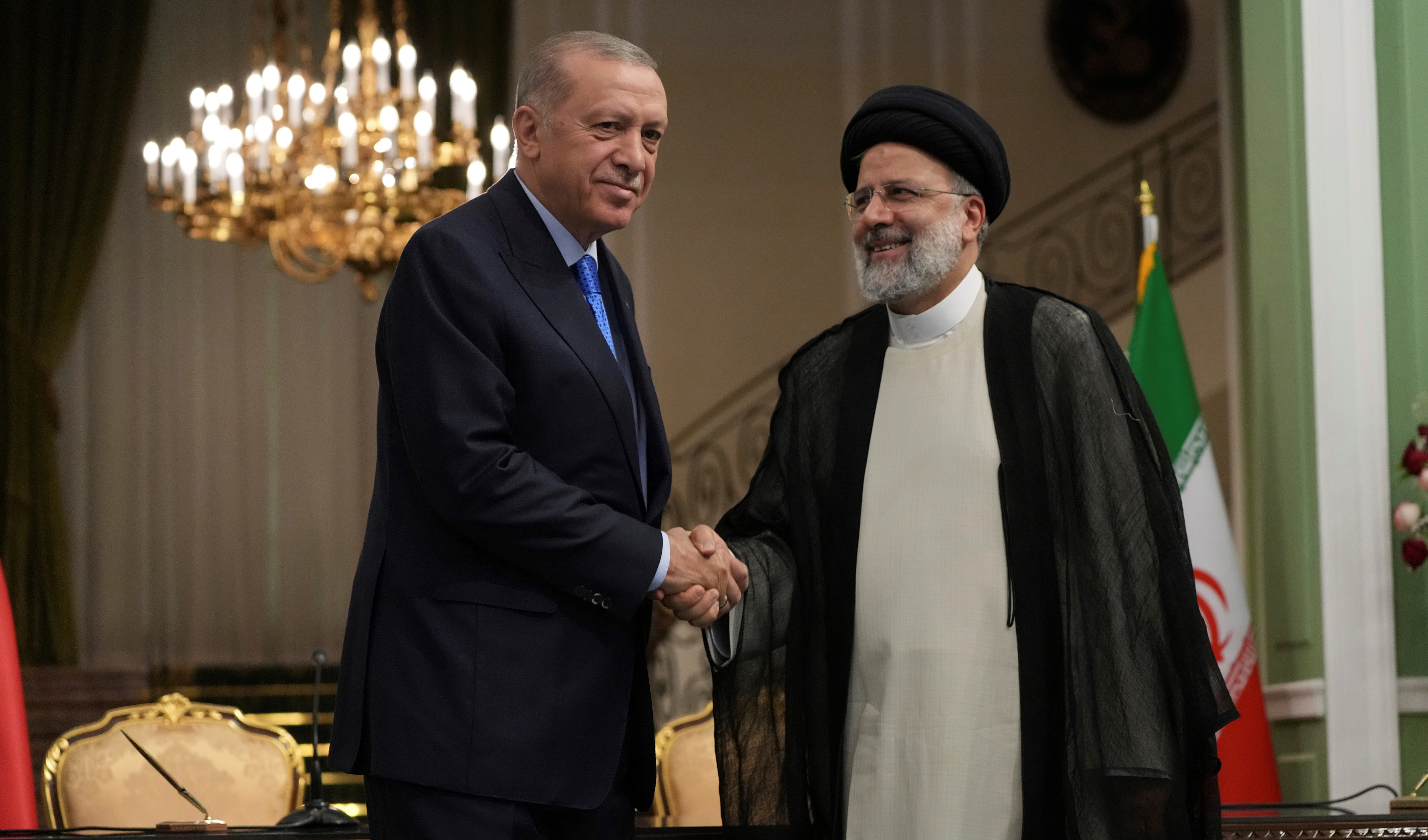Raisi reaffirms importance of cooperation in call with Erdogan
Iranian President Ebrahim Raisi congratulates Turkish President Recep Tayyib Erdogan on his reelection, while the latter reaffirms Ankara's intention to continue quadripartite efforts of cooperation.
-

Turkish President Recep Tayyip Erdogan and his Iranian counterpart Ebrahim Raisi shake hands at the conclusion of their joint press briefing at the Saadabad Palace, in Tehran, Iran, Tuesday, July 19, 2022. (AP)
Iranian President Ebrahim Raisi called Turkish President Recep Tayyip Erdogan, once again, congratulated him on his victory in Turkey's most recent presidential elections and underscored the importance of the regional countries' shared interests.
Raisi, during the phone call, reaffirmed that cooperation will guarantee the interests of regional countries hoping that economic, political, security, cultural, and commercial relations between Tehran and Ankara will further grow during Erdogan's renewed administration.
According to Raisi, Iranian-Turkish cooperation has played a significant role in fostering an atmosphere of stability and security across the region and stressed the importance of accelerating this cooperation between the two nations.
On his part, Erdogan voiced his optimism regarding future cooperation agreements with Tehran insisting that Turkey will continue to cooperate with Iran in various fields.
Moreover, the Turkish President expressed Ankara's desire to further regional cooperation making reference to the quadrilateral cooperation of Turkey, Iran, Syria, and Russia.
"We are determined to continue regional cooperation with more seriousness, including cooperation in the quadripartite framework," said Erdogan.
The increased quadrilateral cooperation, Erdogan explained, will emerge more effective results that will proceed to strengthen and deepen regional ties inevitably expanding economic and commercial cooperation.
The implications of Erdogan's victory on Western stakes: BBC
Erdogan's third term as President has incited the West's concerns about the possible implications his new term might have on global politics, specifically in regard to pressing matters such as NATO, the Russo-Ukrainian war, and refugees.
The recent Turkish elections have been geopolitically charged, while domestically setting it set the Turks on a crossroads between the restoration of Ataturkian national secularism and sustaining the AKP's Islamic populism.
Internationally, this would decide how the West is to comport itself toward issues of concern in the East through Turkey, which stands as an intermediary, the most prominent among which is the war in Ukraine.
President Putin was among the first international leaders to congratulate Erdogan on his third term, praising his "independent foreign policy" as a driving reason for his victory.
Turkey has indeed maintained a distinguished position from its NATO member-state peers. While NATO, along with the EU, has imposed extensive sanctions on Russia and minimized its oil and gas imports from Russia, Turkey adopted a less vehement strategy toward Russia, refusing to "ostracize" the Kremlin, as the BBC report put it.
Turkey has adopted a pragmatic policy in regard to the war in Ukraine. Since Russia launched the special military operation, trade between Turkey and Russia has significantly increased, but Turkey has also been simultaneously selling weapons to Ukraine, according to the report.
Erdogan's pragmatism in regard to Ukraine is in line with his general policy of developing transactional relationships with all his allies in an effort to "make Turkey great again."
The White House was also quick to congratulate Erdogan despite favoring his opponent. Washington's main interest in appeasing Turkey is for the sake of expanding the NATO alliance in an effort to contain Russia.
Turkey has already approved Finland's bid to join NATO but has remained reluctant about Sweden. Turkey stands as a key country to NATO advancement: whereby it grants NATO access to the Black Sea and stands as the precursor for Sweden's ascension to NATO, which grants the military alliance bloc access to the Baltic Sea.
Read more: International leaders congratulate Erdogan on election win

 4 Min Read
4 Min Read








